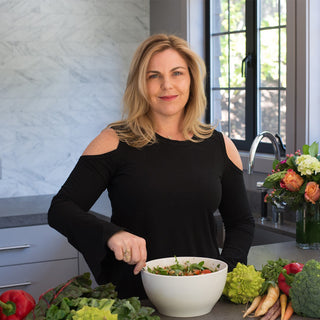There’s nothing like a full stop of human activity to command our undivided attention. Coincidentally or not, it’s also Earth Month, the time of year when people all over the world come together to raise awareness about the importance of advancing environmental protections. Six weeks of confinement have afforded us time to evaluate how immune, or susceptible, we really are to this virus, exposing an unprecedented opportunity for change ahead. As we effectively move through Kubler’s stages of grief, from shock and denial, anger, depression, and finally acceptance, the time has come to pick ourselves up and harness our collective power to effectively respond to this public health crisis. This unique situation has required us all to dig deep, be introspective, and continually search for the silver lining of this challenging and shared experience. What lessons have we learned? How does this pandemic fit into the broader context of public and environmental health that was already severely impacted? Our next steps will be critical to our recovery and hopefully better prepare us for emerging health threats in the future.
Groundhog Days
Through this rare and unprecedented opportunity, people are turning to the tenets of lifestyle medicine to cope with the severe disruption to our routines. With nothing but time, we find relief being outside in nature, exercising daily, gardening, cooking meals from scratch, meditating, and connecting with others. We are witnessing first-hand the positive effect that a significant reduction in human activity can have on the environment. Suddenly, the air quality is clear. Rivers, streams and creeks are clean. An end to the frenetic pace of modern life has ushered the animal kingdom out of hiding. It is these unexpected and beautiful outcomes of our sequestration that should inspire us in designing life after the pandemic.
Unquestionably, the chronic disease burden in this country places us at extremely high risk for viral infections like COVID-19. By the end of March, a study reported that 78% of people being admitted to ICU’s across the U.S. were people with underlying chronic conditions. Now that we see the relative consequences of poor health in the context of a pandemic, we can’t continue with business as usual. We have a moral imperative to invest in prevention and health promotion strategies rather than in tertiary, pharmaceutical management of disease, which has done nothing but fatally complicate the care of individuals with COVID-19. At the core, diet-related diseases are the result of a dysfunctional food culture, health, and social inequities, and harmful environmental policies that serve corporate interests at the expense of the health of Americans. If this pandemic teaches us anything at all, it should reinforce the fact that chronic illness diminishes our innate immunity during the best of times, but particularly against a virus that is so virulent and unrelenting. Unlike this virus, the good news is that the epidemic of chronic disease is entirely within human control. Perhaps this crisis is what was needed to illuminate that we can and we must do better to protect the greater good.
A Delicate Dance
The environment is one of the many factors that greatly influence human health. Climate change is often referred to as “the great multiplier,” which means that in the presence of underlying diseases, pollution, extreme weather events and susceptibility to toxins are the catalyst to early mortality. There is substantial evidence demonstrating that global warming contributes to ideal conditions for dangerous pathogens to thrive. This is due in part to higher temperatures, but also to widespread loss of biodiversity and desertification, which disrupts the intricate balance of organisms biologically designed to protect us from the rise of infectious disease. Every day, we awaken to learn new information about how this virus behaves in humans. A Harvard study recently revealed new information that poor air quality and associated high levels of particulate matter seem to exacerbate the severity of complications from the coronavirus. We don’t have to look too far for examples of the environment’s effect on public health. The opportunity ahead requires us to address the multifaceted root causes of pandemics, considering environmental influences just as much as our own behavior.
To ensure this crisis doesn’t go to waste, there are steps each of us can take to build resilience, enhance our immunity and create healthier conditions for humans around the globe.
- An Ounce of Prevention Is Worth A Pound of Cure
Our greatest defense now and always is an unwavering commitment to preventative lifestyle behaviors to ease the global disease burden, not only in response to a pandemic. Bolstering our immune system against viruses like coronavirus necessitates a commitment to healthy habits across the lifespan, ultimately offering us a fighting chance to meet moments like these and survive. As a society, we need to create equitable opportunities for people of lower socioeconomic backgrounds to gain greater access to fresh, healthy food and areas for safe recreation and exercise. The time of reckoning of our manic obsession with work is upon us. Going forward, we need to be more efficient with our time and seek to strike a balance between the drive to get ahead and allowing ample time for rest and recovery.
- Meatless Isn’t Just For Mondays
The world now produces four times the amount of meat compared to 50 years ago (Richie & Roser, 2019). David Quammen, author of Spillover, explains how Zoonotic diseases like SARS Cov-2 (COVID-19) jump from animals to humans in this fascinating podcast. Cross-species infections arise from overproduction and consumption of animal protein globally. Illegal “wet” markets and indiscriminate slaughter of animals has created unusual opportunities for animal viruses to flourish in the human population. The animal protein supply chain is so robust and inexpensive that meat has made its way into every meal of every day for most Americans. If everyone reduced the amount of meat they ate by just a few meals a week, there would be huge human and environmental health benefits. Alternatively, plant proteins offer paralleled nutrition and are significantly less inflammatory, thereby causing less potential for disease.
- “It’s Not the Cow it’s The How”
Regenerative and holistic animal production practices will help restore animal consumption patterns back to normal levels while also providing a front and center solution for reversing climate change. Reports examining the benefit of holistic animal management consider these dual strategies necessary to reduce greenhouse gas emissions to pre-industrial farming levels. Coupling more meatless days with voting with your dollars to vastly improve animal agriculture practices will go a long way in reestablishing biodiversity and build our capacity to protect against animal-borne diseases.
- Ban Industrial & Processed Food
Destructive practices driven by globalization and corporate interests have perpetuated an ideal breeding ground for virulent pathogens to thrive. Encroachment into rainforest and wildlife territories has substantially increased over the last 50 years as a result of urban expansion and Agribusiness interests. This loss of habitat has made way for possibilities of exposure to pathogens that once only existed in the wild. It is clear that destroying natural resources to scale up production for agriculture is undermining public health across the globe. These practices perpetuate inhumane treatment of animals and land mismanagement favoring monoculture of commodity crops. Surpluses of these crops make their way onto supermarket shelves in the form of processed junk food that perpetuates diet-related illness, the clear Achilles heel in a pandemic.
- Plant A Garden
Ecological biodiversity provides built-in protection against the rise of bacterial and viral infections, just like our own immune system under normal, healthy conditions. One amazing outcome of our imposed confinement is that the country is planting Victory gardens again. In the 1950s, 45% of the population grew their own food out of an abundance of fear of scarcity during the war. Today, less than 1% of households grow food in their backyards. While gardening has a myriad of health benefits, eating fresh healthy produce from kitchen gardens reduces exposure to harmful environmental pollutants that are prolific in our food system, today while also greatly reducing our carbon footprint. There is no better example of an outcome of this crisis that improves both human and environmental health equally.
The Greatest Wealth Is Health
It may be difficult to see anything positive about this situation right now because it’s still too raw and the end is not clear. COVID-19 is still devastating lives in unthinkable and unimaginable ways. But, as we look back on this period in our lives, perhaps we will see it as a gift—the gift of time to re-evaluate our lives and reinvest in what matters most. The silver lining here is our chance to create changes that will lead to a healthier society. Emerging from this disaster, we are wiser with renewed priorities. Working from remote locations around the country has been an important exercise in evaluating the extent to which we can continue to be productive members of society, while also greatly reducing our carbon footprint. As our nation begins the healing process, let us not forget that the only investment worth making now is what is best for public health. And when, not if, the next pandemic hits, we’ll be better prepared from what we’ve learned from this national crisis—or better yet, opportunity.
)

